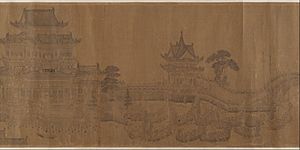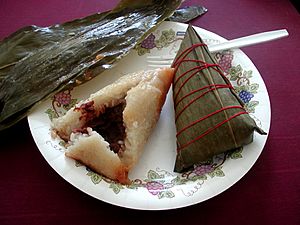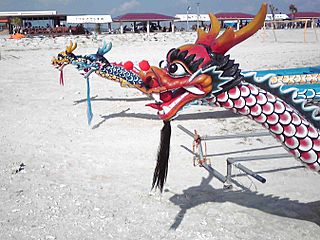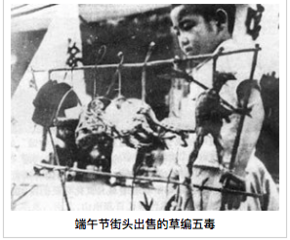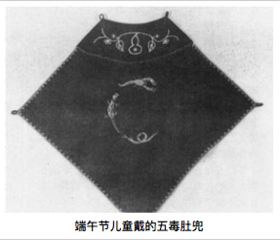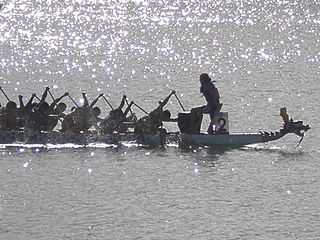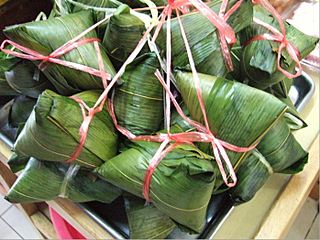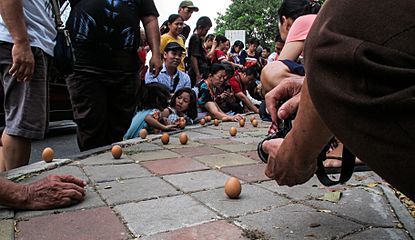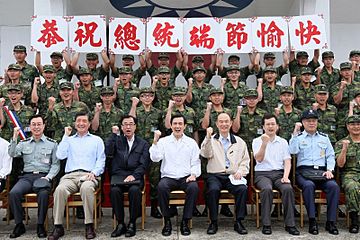Duanwu Festival facts for kids
Quick facts for kids Dragon Boat Festival |
|
|---|---|
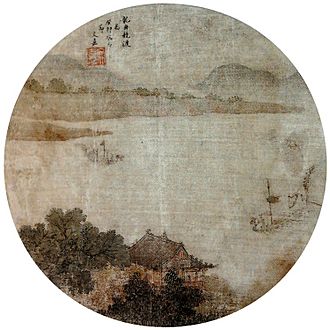
Dragon Boat Festival (18th century)
|
|
| Observed by | Chinese |
| Type | Cultural |
| Observances | Dragon boat racing, consumption of realgar wine and zongzi |
| Date | Fifth day of the fifth lunar month, May 5th of the Chinese Calendar |
| 2023 date | 22 June |
| 2024 date | 10 June |
| 31 May | |
| 2026 date | 19 June |
| Frequency | Annual |
| Related to | Tango no sekku, Dano, Tết Đoan Ngọ, Yukka Nu Hii |
The Dragon Boat Festival (traditional Chinese: 端午節; simplified Chinese: 端午节; pinyin: Duānwǔ Jié) is a very old Chinese holiday. It happens on the fifth day of the fifth month of the Chinese calendar. This usually falls in late May or June in our regular calendar.
This holiday remembers an ancient poet named Qu Yuan. People celebrate by holding exciting dragon boat races. They also eat special sticky rice dumplings called zongzi. The festival is a mix of honoring ancestors, wishing for good luck, and having fun.
In 2009, UNESCO added the Dragon Boat Festival to its list of important cultural traditions. This made it the first Chinese holiday to get this special recognition!
Contents
Names of the Festival
The most common English name for this holiday is Dragon Boat Festival. This is the official name used in China.
Sometimes, you might hear it called the Double Fifth Festival. This name comes from the Chinese calendar. The festival is celebrated on the fifth day of the fifth month.
How the Name Sounds in Chinese
The Chinese name for the festival (simplified Chinese: 端午节; traditional Chinese: 端午節) sounds different depending on where you are in China.
In Mainland China and Taiwan, it's called Duānwǔjié. The word Duanwu can mean "starting horse day." But it also sounds like the Chinese word for "five." So, it means the festival on the "fifth day of the fifth month."
In Cantonese, spoken in places like Hong Kong and Macau, it's called Tuen Ng Jit or Tung Ng Jit.
History of the Festival
Why it Started
Long ago, people believed the fifth lunar month was unlucky. The fifth day of this month was thought to be especially bad. To keep bad luck away, people would hang plants like calamus and Artemisia above their doors. These plants had strong smells and were shaped like swords. People thought they would scare away evil.
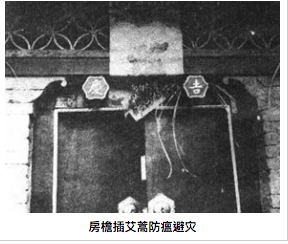
People also believed that venomous animals like snakes and scorpions appeared more often after this day. They also thought people got sick easily. So, during the Dragon Boat Festival, people tried to avoid this bad luck. For example, they might put pictures of five venomous creatures on the wall and stick needles in them. Sometimes, they made paper cutouts of these creatures for children to wear. Over time, these practices grew into big celebrations. The Dragon Boat Festival became a day to get rid of sickness and bad luck.
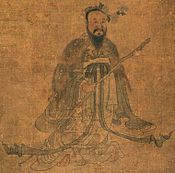
Older Traditions
Some experts think the festival started even before the Qu Yuan story. It might have been a way to celebrate farming, good harvests, and rice growing in southern China.
Another idea is that the Dragon Boat Festival came from dragon worship. Dragons are very important in Chinese culture. The dragon boat races and the zongzi food might have been offerings to the dragon king.
Some also believe the festival celebrates the harvest of winter wheat. People often made offerings to gods and spirits during harvest times. As different regions shared their traditions, these similar festivals eventually became one big holiday.
In the Past Century
In the early 1900s, the Dragon Boat Festival was also known as the "Festival of Five Poisonous Insects." People believed that at noon on the fifth day of the fifth month, poisonous insects and reptiles were paralyzed. Some doctors would collect them then to use as medicine.
Today's Holiday
In 2008, the Dragon Boat Festival became a national public holiday in China. This helped to celebrate and boost traditional Chinese culture.
A Public Holiday
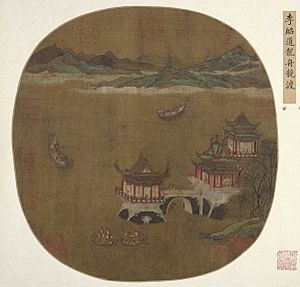
The Dragon Boat Festival is a public holiday in China, Hong Kong, Macau, and Taiwan. The Chinese government made it a public holiday again in 2008.
Chinese communities in other parts of Asia, like Singapore and Malaysia, also celebrate it. Similar festivals are held in Korea (Dano) and Japan (Tango no sekku).
Activities and Traditions
Three of the most popular activities during the Dragon Boat Festival are eating zongzi, drinking realgar wine, and racing dragon boats.
Dragon Boat Racing
Dragon boat racing is a very old tradition, going back over 2500 years. The most famous story behind it is about Qu Yuan. He was a good government official who lived in the ancient state of Chu. Other officials were jealous and lied about him. The king then sent him away.
Qu Yuan was very sad and disappointed. He drowned himself in the Miluo River. When people heard, they rushed to the river in boats to try and save him. They couldn't find his body. To keep fish from eating his body, they threw rice into the water. This is one of the reasons people eat zongzi today. To remember Qu Yuan, people now hold dragon boat races every year on the day he died.
Zongzi (Traditional Chinese Rice Dumpling)
A big part of the Dragon Boat Festival is making and eating zongzi with family and friends. Zongzi are sticky rice dumplings. People make them by wrapping glutinous rice and different fillings in large leaves, usually from reeds or bamboo. They shape them like pyramids. The leaves give the rice a special smell and taste.
The fillings for zongzi are different depending on the region. In northern China, people often like sweet zongzi. They might have bean paste, dates, and nuts inside. In southern China, people prefer savory zongzi. These can have eggs, meat, and other tasty fillings.
Zongzi were first used to honor ancestors and gods. Later, during the Jin Dynasty, they became the official food for the Dragon Boat Festival.
Food Related to the Number Five
The word 'Wu' in 'Duanwu' sounds like the number five in many Chinese languages. Because of this, some regions have traditions of eating foods related to the number five. For example, in Guangdong and Hong Kong, people sometimes eat congee (rice porridge) made from five different types of beans.
Realgar Wine
Realgar wine is a Chinese alcoholic drink. It's made by adding powdered realgar (a yellow mineral) to Chinese liquor. In the past, people used it as a pesticide and thought it could protect against sickness and poison. During the Dragon Boat Festival, some people would put realgar wine on children's faces. They believed this would scare away the "five poisonous creatures."
Five-Colored Silk-Threaded Braid
In some parts of China, people, especially children, wear silk ribbons or threads with five colors. These colors are blue, red, yellow, white, and black. They represent the five elements in Chinese philosophy. People believe wearing these braids helps keep evil away.
Other common activities include hanging pictures of Zhong Kui, who is a mythical guardian. People also hang mugwort and calamus plants. Some take long walks or wear small bags filled with perfumed medicine. Another fun tradition is trying to make an egg stand upright at noon. People believe that if you succeed, you'll have good luck for the next year! All these activities were thought to prevent sickness and bring good health.
In the early 1900s, the Dragon Boat Festival was also called "Poets' Day." This was to honor Qu Yuan, who is known as China's first great poet.
Gallery
-
Hari in Tomigusuku, Okinawa, Japan.
-
Egg balancing in Tangerang, Indonesia
-
ROC (Taiwan) President Ma Ying-jeou visits Liang Island before Dragon Boat Festival (2010)
'恭祝總統端節愉快'
('Respectfully Wishing the President a Joyous Dragon Boat Festival')
See also
 In Spanish: Fiesta del Barco del Dragón para niños
In Spanish: Fiesta del Barco del Dragón para niños


